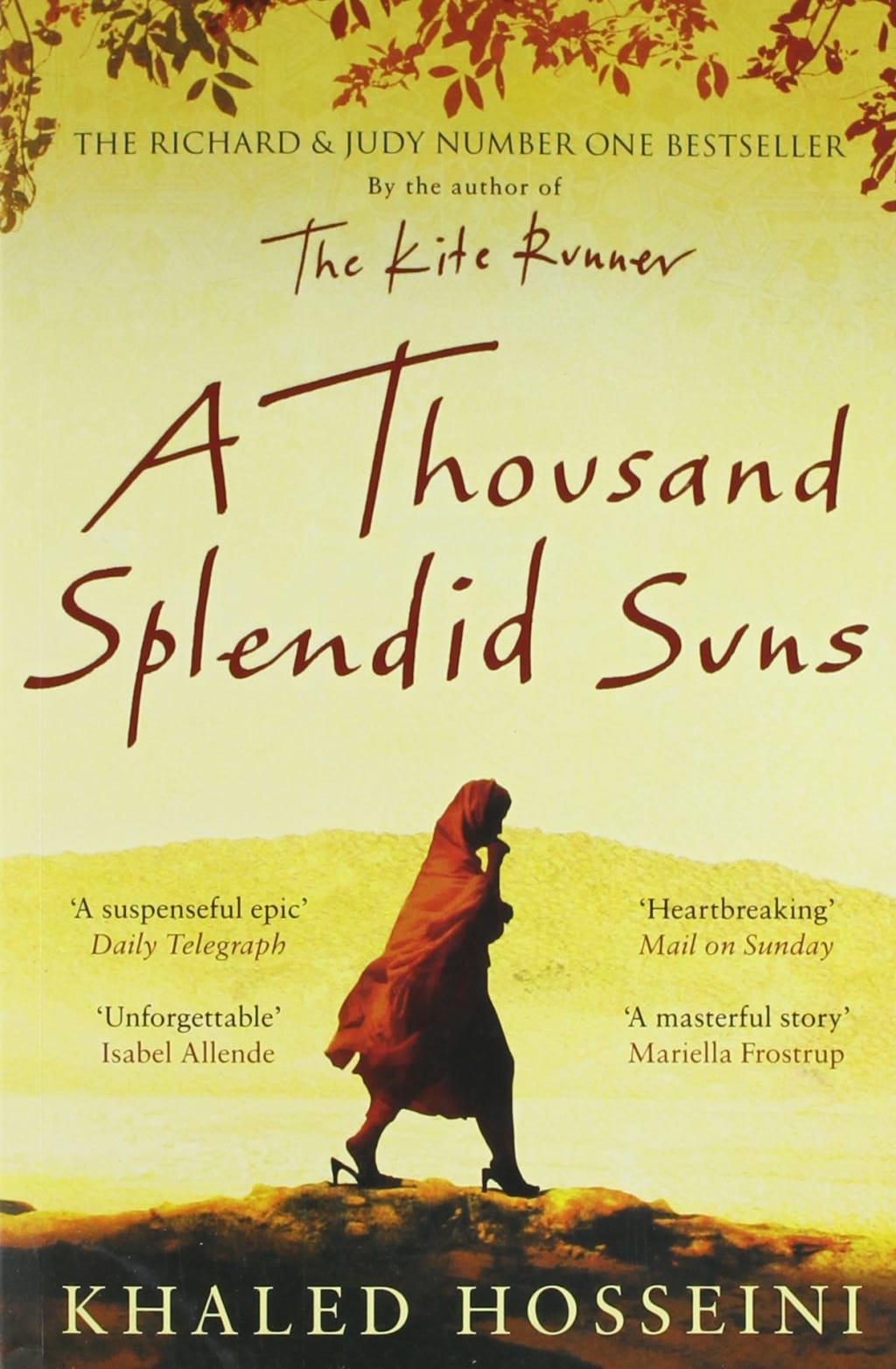A Thousand Splendid Suns By Khaled Hosseini – Book Summary: A Story Of Female Friendship And Sacrifice
If you are looking for a book that makes you wail, A Thousand Splendid Suns by Khaled Hosseini is it.

If you are looking for a book that makes you wail, A Thousand Splendid Suns by Khaled Hosseini is it.
I had heard many things about Hosseini’s first novel, The Kite Runner, but I wanted to begin with his second one. And I didn’t regret it at all.
The story is set in Afghanistan spanning from the Soviet invasion (1960s) to Taliban control (2000s). We see the war-torn country through the eyes of two wives married to the same man.
You will either read the story from Mariam’s perspective or Laila’s. The dual narrative of the two women is what keeps the novel moving. Afghanistan’s situation is depicted in the book (beard patrols, different hospitals for men and women), but it is not a driving force in the story.
First let’s talk about wife #1, Mariam. She grows up in Herat as an illegitimate child. Her mother is bitter towards her and leaves no chance to remind her that she wasn’t supposed to be born. She also keeps advising her of a “woman’s place” in their world (she turns out to be right soon enough):
“Learn this now and learn it well. Like a compass facing north, a man’s accusing finger always finds a woman. Always. You remember that, Mariam.”
Mariam’s father, Jalil, visits her only once a week. He has a life of his own with three wives and other “legitimate” children. When Mariam shows up at his door one day, she is made to sleep outside because none of his wives would accept her inside. The next day when Mariam reaches back her home, her mother had committed suicide.
She is not accepted in her father’s home. Jalil marries her off when she was 15 to a 45-year old man, Rasheed.
At first, Rasheed seems decent and it looks like things might finally take a good turn for Mariam, but when Mariam is dealing with one miscarriage after another, Rasheed quickly resorts to abuse. Readers learn Rasheed’s story, how he lost his son years ago, and although one does pity him, his trauma does not justify his actions. Rasheed is only using Mariam to replace a son he lost years ago.
His contempt, force to wear a burqa, and contempt makes Mariam shiver in his fear:
“his shifting moods, his volatile temperament, his insistence on steering even mundane exchanges down a confrontational path that, on occasion, he would resolve with punches, slaps, kicks, and sometimes try to make amends for with polluted apologies and sometimes not.”
Now, let’s talk about wife #2, Laila, and how she came into the picture. Laila is the stark opposite of Mariam. She is educated, knows how to stand up for herself, and it is through her lens that we see taboo-filled activities of the time like premarital sex. Her privilege is her intellectual feminist father:
“I know you’re still young but I want you to understand and learn this now. Marriage can wait, education cannot. You’re a very very bright girl. Truly you are. You can be anything you want Laila. I know this about you. And I also know that when this war is over Afghanistan is going to need you as much as its men maybe even more. Because a society has no chance of success if its women are uneducated Laila. No chance.”
But Laila’s luck soon runs out. Her brothers are called into the war and suffer death. She seeks comfort in her friend and neighbor, Tariq. As they grow up to become teenagers, they also fall in love. But soon enough, Tariq moves with his family to become refugees in Pakistan. Laila’s parents decide to follow, but a stray rocket kills them both and wounds her.
She becomes a 14-year old injured orphan pregnant with her boyfriend’s child. Her last glimmer of hope dies when she learns that Tariq is dead. It is under these circumstances that she agrees to marry Rasheed, knowing that she and her baby cannot survive in the streets of Kabul alone.
In the beginning, Mariam sees Laila as her rival and is extremely jealous of her, wanting nothing to do with her. Many readers find this unreasonable knowing how horrible Rasheed is, but I find the complexity enriching the story. After all, Rasheed is the only one Mariam had at that point in her life. Victims often feel complex feelings towards their abuser. It was difficult to depict it, but Hosseini did an outstanding job.
Mariam softens towards Laila after the birth of her daughter, Aziza. Gradually, the women become each other’s allies against Rasheed’s temper and best friends. It is from this point that the story becomes the tale of friendship between two women. Mariam also becomes a parental figure to Aziza.
After years of enduring Rasheed’s torture, witnessing the difficult every-day life in Kabul, and giving birth to a son, Zalmai, Laila finds Tariq standing at her front door. She learns that Tariq’s death was a trap set by Rasheed so that Laila doesn’t run away.
When Rasheed learns of the afternoon Laila and Rasheed spent together, he brutally beats Laila. Coming for her best friend’s aid, Mariam kills Rasheed with a shovel. She turns herself over to the Taliban the following morning so that Laila can begin a new life with Tariq in Pakistan.
And that does happen. Laila and Tariq live the life of their dreams with the children. When they decide to move back to Kabul in September 2001 (after the US invasion), they go through Herat (Mariam’s hometown) and Laila learns that Mariam is executed. I have never bawled as hard as I did when I read of Mariam’s final moments:
“Mariam wished for so much in those final moments. Yet as she closed her eyes, it was not regret any longer but a sensation of abundant peace that washed over her. She thought of her entry into this world, the harami child of a lowly villager, an unintended thing, a pitiable, regrettable accident. A weed. And yet she was leaving the world as a woman who had loved and been loved back. She was leaving it as a friend, a companion, a guardian. A mother. A person of consequence at last. No. It was not so bad, Mariam thought, that she should die this way. Not so bad. This was a legitimate end to a life of illegitimate belongings.”
Mariam didn’t have an easy day in her whole life. As much as I loved Laila, I can’t help but see this as a story of Mariam and how unfair life can be. Mariam is the epitome of the toughness of human spirits. The tale of Laila and Mariam is proof of what love, compassion, and friendship can do in desperate times.
Laila becomes a schoolteacher in an orphanage in Kabul. When she becomes pregnant again, she knows what she’d want to name the child if it was a girl:
“But the game involves only male names. Because, if it’s a girl, Laila has already named her”
About the Creator
Rochi Zalani
Rochi is a staff writer at ECM who relishes fresh poetry. She talks about books, poems, and the life on her website. If you believe there is nothing that cannot be cured by some Mary Oliver poetry, subscribe to her weekly newsletter.






Comments
There are no comments for this story
Be the first to respond and start the conversation.